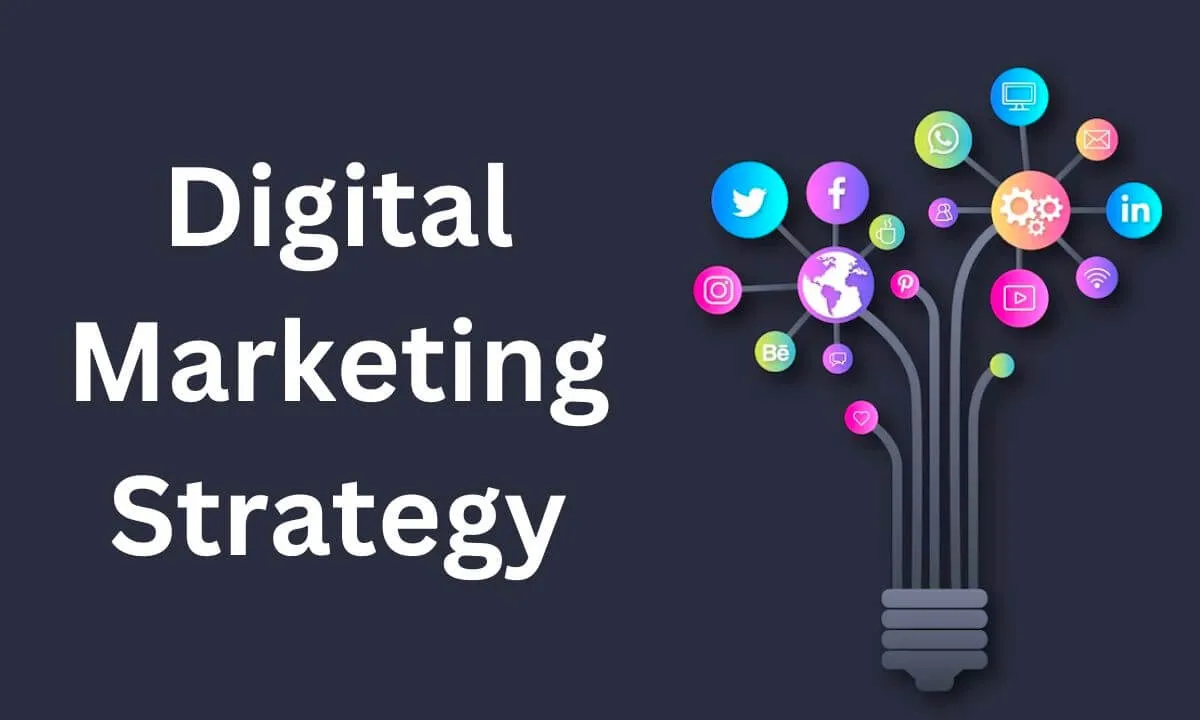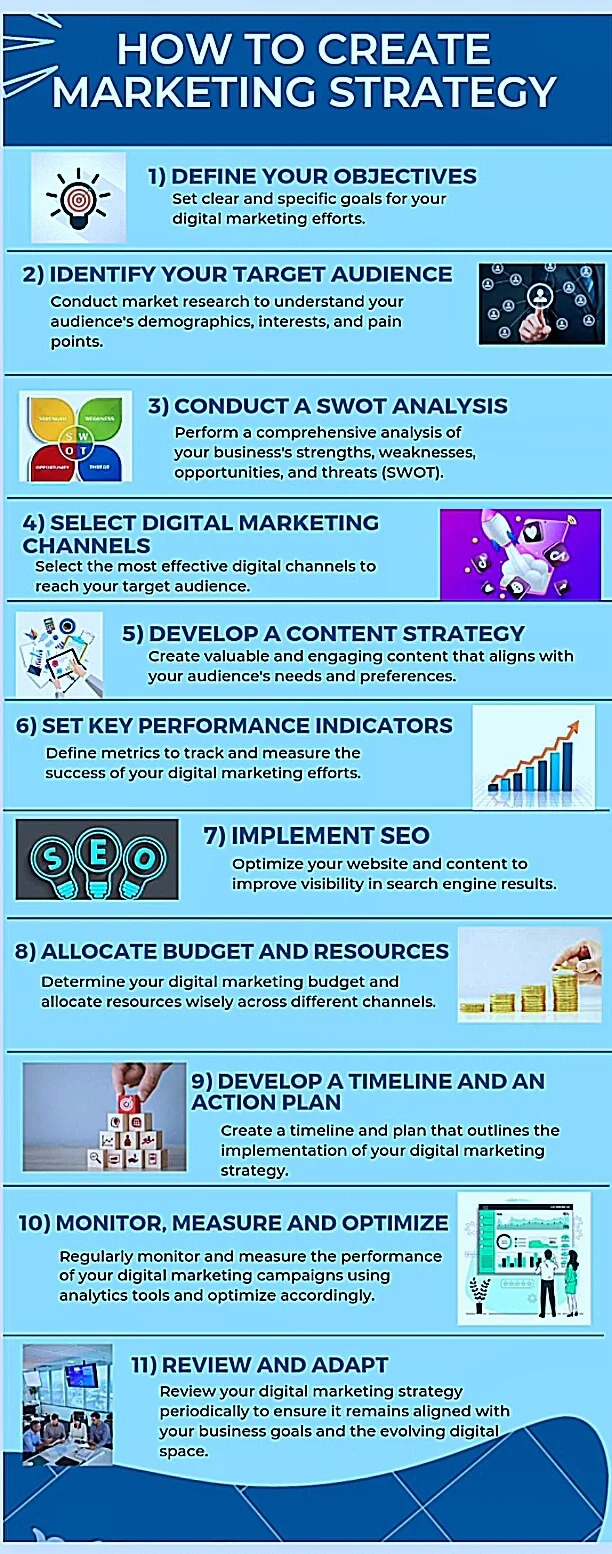In this fast-paced digital world, businesses face the challenge of standing out among the online noise and connecting with their target audience effectively.
This is where a well-crafted digital marketing strategy becomes an indispensable tool for success.
Whether you’re a startup looking to establish a strong online presence or an established company aiming to expand your digital reach, understanding and implementing a digital marketing strategy is essential.

If you have struggled with creating an effective digital marketing strategy in times past or are completely lost as to what a digital marketing strategy is all about, then, this article is for you.
What is a Digital Marketing Strategy?
A digital marketing strategy refers to a comprehensive plan of action that outlines how a business or organization will leverage various digital channels, technologies, and tactics to achieve its marketing goals and objectives.
It is a strategic approach that focuses on utilizing digital platforms such as websites, search engines, social media, email, content marketing, and more to connect with target audiences, build brand awareness, drive traffic, generate leads, and ultimately convert them into loyal customers.
In essence, a digital marketing strategy serves as a roadmap that guides businesses in harnessing the power of digital platforms to effectively promote their products or services, engage with their target audience, and achieve their overall marketing objectives.
The Benefits of a Well-Designed Marketing Strategy
A well-designed digital marketing strategy offers numerous benefits that can significantly impact the success and growth of a business.
Here are some key advantages:
Increased Brand Visibility
A digital marketing strategy helps businesses establish a strong online presence, allowing them to reach a wider audience.
Enhanced Customer Insights
Digital marketing strategies incorporate data collection and analysis, providing businesses with valuable insights into customer behavior, preferences, and demographics.
This data allows businesses to make informed decisions and optimize their marketing efforts based on real-time feedback.
Targeted Audience Engagement
By understanding the preferences, behaviour, and needs of the target audience, businesses can tailor their messaging and content to resonate with their audience, resulting in higher levels of engagement and interaction.
Improved Conversion Rates
Compelling content, personalized experiences, and effective call-to-actions can help businesses guide potential customers through the sales funnel and increase the likelihood of conversions and purchases.
Cost-Effectiveness
With a well-designed strategy, businesses can allocate their resources more efficiently by focusing on digital channels that offer higher returns on investment (ROI) and optimizing campaigns based on data-driven insights.
Increased Customer Loyalty and Retention
Through personalized communication, targeted offers, and value-added content, businesses can enhance customer loyalty, encourage repeat purchases, and foster long-term relationships with their customers.
Competitive Advantage
By leveraging digital channels effectively and adapting to emerging trends, businesses can differentiate themselves, position their brand as an industry leader, and gain a competitive edge in the digital landscape.
Measurable Results and ROI
Key performance indicators (KPIs) such as website traffic, conversions, engagement metrics, and ROI can be monitored and analyzed, enabling businesses to assess the effectiveness of their strategies and make data-driven decisions for continuous improvement.
A Step-by-Step Process to Create Your Digital Marketing Strategy
Having exposed you to what a digital marketing strategy is, and some of its benefits, it is high time we ran through how to create a digital marketing strategy in a detailed approach.
To achieve a well-rounded and effective approach, these steps will serve as a guide. Follow these steps to develop your digital marketing strategy:

Step 1: Define Your Objectives
Start by clearly defining your digital marketing objectives. These should align with your overall business goals.
Make sure your objectives are specific, measurable, achievable, relevant, and time-bound (SMART).
Step 2: Identify Your Target Audience
Conduct market research to identify your target audience. Understand their demographics, preferences, behaviour, needs, and pain points.
This information will help you tailor your messaging and select the most appropriate digital channels to reach and engage with your audience effectively.
Step 3: Conduct a SWOT Analysis
Perform a comprehensive analysis of your business’s strengths, weaknesses, opportunities, and threats (SWOT).
Identify your unique selling points, competitive advantages, and areas for improvement. This analysis will help your brand stand out.
Step 4: Select Digital Marketing Channels
Based on your target audience and objectives, choose the digital marketing channels that will best reach and engage your audience. Each channel should align with your goals and audience preferences.
Step 5: Develop a Content Strategy
Determine the types of content that will resonate with your audience, such as blog posts, videos, infographics, or eBooks.
Plan your content calendar, ensuring it addresses audience pain points, provides value, and aligns with your brand voice.
Step 6: Set Key Performance Indicators (KPIs)
Define the key metrics that will measure the success of your digital marketing efforts. These metrics may include website traffic, conversion rates, engagement rates, email open rates, or social media followers.
Set specific targets for each metric to track progress and evaluate the effectiveness of your strategy.
Step 7: Implement Search Engine Optimization (SEO)
Optimize your website and content for search engines. Conduct keyword research to identify relevant search terms and incorporate them into your website copy, meta tags, and headings.
Step 8: Allocate Budget and Resources
Determine the budget and resources required to execute your digital marketing strategy effectively.
Consider costs such as advertising, content creation, marketing tools, and personnel. Allocate resources based on your priorities and ensure a balanced approach across different channels and tactics.
Step 9: Develop a Timeline and Action Plan
Create a timeline that outlines the implementation of your digital marketing strategy. Break it down into actionable steps, specifying who is responsible for each task and the deadlines for completion.
This will help you stay organized and accountable throughout the execution process.
Step 10: Monitor, Measure, and Optimize
Regularly monitor and measure the performance of your digital marketing campaigns using analytics tools.
Track the KPIs you set earlier and analyze the data to gain insights into what’s working and what needs improvement.
Step 11: Review and Adapt
Review your digital marketing strategy periodically to ensure it remains aligned with your business goals and the constantly evolving digital space.
Implementing and Optimizing Your Strategy
After creating a well-planned digital marketing strategy, implementing and optimizing your strategy should be the next option. Here are some nuggets on how to go about this:
- Clearly define roles and responsibilities within your team or organization for executing different aspects of the strategy. Ensure everyone understands their tasks and timelines.
- Develop and publish high-quality content across various channels based on your content strategy.
- Set up and launch digital marketing campaigns on chosen channels.
- Continuously monitor KPIs defined in your strategy.
- Analyze the collected data to identify trends, patterns, and areas of improvement.
- Implement conversion tracking to measure the effectiveness of different marketing channels and campaigns in driving desired actions, such as purchases, form submissions, etc.
- Conduct A/B testing by creating variations of your campaigns, landing pages, or emails.
- Optimize your landing pages to improve conversion rates.
- Continuously optimize your advertising campaigns by adjusting targeting parameters, ad creatives, bidding strategies, and budgets based on performance metrics and insights.
- Keep abreast of industry trends, digital marketing best practices, and new tools or technologies.
- Gather and analyze customer feedback through surveys, reviews, or social media monitoring.
- Continually monitor and analyze the digital marketing efforts of your competitors. Use this to make necessary adjustments to your strategy.
- Be open to experimenting with new tactics, channels, or approaches. Test innovative ideas and measure their impact.
What is a Digital Marketing Strategy FAQs
What is a digital marketing strategy?
A digital marketing strategy is a plan of action that outlines how a business will leverage various digital channels and tactics to achieve its marketing goals.
It involves identifying target audiences, selecting appropriate digital channels, setting objectives, and implementing campaigns to promote products or services online.
Why is a digital marketing strategy important for businesses?
A digital marketing strategy is crucial for businesses because it helps them effectively reach and engage their target audience in the digital realm.
It enables businesses to build brand awareness, drive website traffic, generate leads, and ultimately increase conversions and revenue.
How do you develop a digital marketing strategy?
To develop a digital marketing strategy, you should follow these steps:
- Define your goals and objectives.
- Identify your target audience.
- Research your competitors and industry.
- Choose the appropriate digital marketing channels.
- Create compelling and relevant content.
- Develop a budget and allocate resources.
- Implement and track your campaigns.
- Analyze results and make necessary adjustments.
What are the different digital marketing channels and how do they fit into a strategy?
Different digital marketing channels include Search Engine Optimization (SEO), Pay-Per-Click Advertising (PPC), Social Media Marketing (SMM), Email Marketing, Content Marketing, Influencer Marketing, Affiliate Marketing, Mobile Marketing, Video Marketing.
These channels can be utilized based on your target audience, goals, and budget, and can be integrated into a comprehensive digital marketing strategy.
How often should I review and update my digital marketing strategy?
It is recommended to review and update your digital marketing strategy at least annually or whenever significant changes occur in your business, industry, or target audience.
Regular monitoring and evaluation of campaign performance should be conducted to make adjustments and optimize results.
Conclusion
A well-crafted digital marketing strategy is the compass that guides your online presence, helping you navigate the dynamic digital landscape with confidence.
By understanding the core concepts and following the step-by-step process outlined in this article, you will be well-equipped to create a robust digital marketing strategy that propels your business toward growth, customer engagement, and lasting success.
Also Read:
 PrimeGate Digital is a Result Driven Blog that strives to go beyond ‘Conventional Digital Marketing’ through digital innovation and performance marketing. We have experience working with world class brands and products.
PrimeGate Digital is a Result Driven Blog that strives to go beyond ‘Conventional Digital Marketing’ through digital innovation and performance marketing. We have experience working with world class brands and products.
